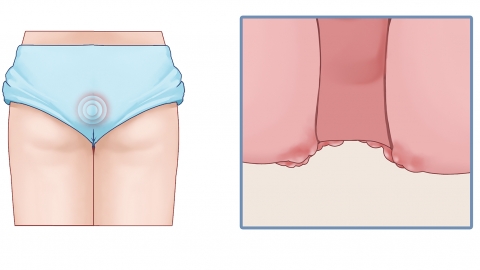What causes numbness in the anus?
Generally, anal numbness may be caused by poor blood circulation, nerve conduction disorders, perianal eczema, hemorrhoids, rectal prolapse, and other reasons. If discomfort occurs, timely medical consultation is recommended. A detailed explanation is as follows:

1. Poor Blood Circulation
Maintaining the same posture for prolonged periods, such as sitting or standing for long durations, can slow blood circulation in the anal area, leading to local tissue hypoxia and insufficient nutrient supply, which may cause numbness. It is recommended to get up and move regularly to improve local blood circulation. Wearing loose clothing can also help alleviate symptoms.
2. Nerve Conduction Disorders
Prolonged pressure on the anal area, such as from extended periods of cycling or improper sitting posture, may hinder nerve conduction function and cause numbness. Avoid staying in the same sitting position for long periods, especially positions that cause continuous pressure on the anal area. Adjust sitting posture appropriately or use cushions and other assistive tools to reduce pressure.
3. Perianal Eczema
Perianal eczema may be an inflammatory skin disease of the epidermis and superficial dermis caused by various internal and external factors. Local dampness and irritation can lead to itching, redness, and pain around the anus. Long-term repeated scratching may damage the skin, potentially leading to infection and affecting nerve conduction, which causes numbness. Symptoms may include intense itching, thickened skin, and pigmentation. Treatment may include medications such as hydrocortisone cream, mometasone furoate cream, erythromycin ointment, and others, as advised by a physician.
4. Hemorrhoids
Hemorrhoids may develop when the anal cushions at the lower end of the rectum undergo pathological hypertrophy, forming varicose venous masses around the anus. When the condition is severe, it may lead to anal sphincter relaxation, causing the anus to lose contractile force and prolapse, making it susceptible to friction and irritation from residual fecal matter, inducing anal discomfort, including numbness. Accompanying symptoms may include a sensation of rectal fullness, pain, and bleeding during bowel movements. Treatment should follow medical advice and may include medications such as Zhisuning tablets, Qinghuo Zhimai tablets, and Ma Yinglong hemorrhoid ointment.
5. Rectal Prolapse
Rectal prolapse is usually caused by long-term increased abdominal pressure, weakened pelvic floor muscles, and other factors that lead to downward displacement of part or all layers of the rectal wall. When the rectum completely protrudes from the anus, it can exert pressure and cause friction on the anal area, resulting in numbness. Symptoms may also include a feeling of anal heaviness, incomplete evacuation, constipation, and others. Treatment options include anal sphincteroplasty, rectal suspension fixation, and other procedures under medical guidance. Pelvic floor muscle function can also be improved through exercises such as anal tightening exercises.
To prevent this symptom, it is recommended to avoid prolonged sitting or standing in daily life, get up and move regularly to improve local blood circulation, maintain local cleanliness and dryness, and wash the anal area daily with warm water to prevent infection.









